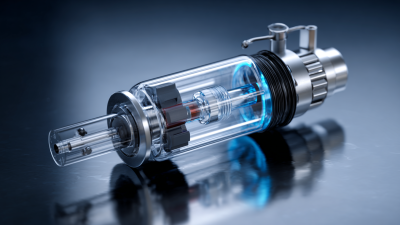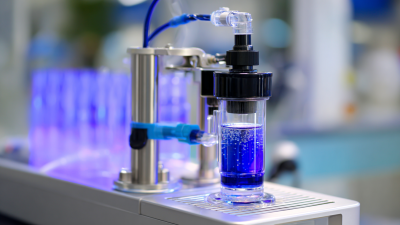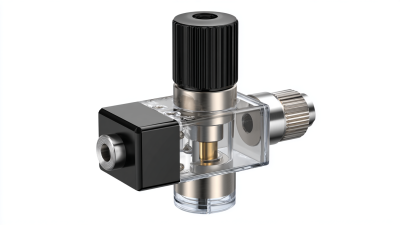In the ever-evolving landscape of modern industries, the importance of precise pH management cannot be overstated. pH dosing pumps play a critical role in maintaining optimal pH levels across various processes, from water treatment facilities to chemical manufacturing. According to a recent report by MarketsandMarkets, the global pH meter market is expected to reach $1.8 billion by 2025, highlighting the growing reliance on advanced dosing systems for ensuring compliance with environmental regulations and achieving process efficiency.
 These pumps not only contribute to product quality and safety but also help in reducing operational costs by minimizing chemical usage and waste generation. As industries continue to seek sustainable solutions, understanding the functionality of pH dosing pumps becomes essential for engineers and decision-makers striving to enhance productivity and ensure environmental stewardship.
These pumps not only contribute to product quality and safety but also help in reducing operational costs by minimizing chemical usage and waste generation. As industries continue to seek sustainable solutions, understanding the functionality of pH dosing pumps becomes essential for engineers and decision-makers striving to enhance productivity and ensure environmental stewardship.
 pH dosing pumps play a crucial role in industrial water treatment processes by ensuring that water maintains the desired acidic or alkaline balance. In various sectors, including manufacturing, pharmaceuticals, and food production, the quality of water used is essential to the efficiency and safety of operations.
pH dosing pumps are employed to accurately inject acids or bases into water systems, thereby maintaining optimal pH levels that promote effective chemical reactions and prevent equipment corrosion.
pH dosing pumps play a crucial role in industrial water treatment processes by ensuring that water maintains the desired acidic or alkaline balance. In various sectors, including manufacturing, pharmaceuticals, and food production, the quality of water used is essential to the efficiency and safety of operations.
pH dosing pumps are employed to accurately inject acids or bases into water systems, thereby maintaining optimal pH levels that promote effective chemical reactions and prevent equipment corrosion.
Moreover, the precision of pH dosing pumps minimizes the risks associated with improper chemical dosing. By continuously monitoring the pH levels and adjusting the dosing accordingly, these pumps contribute to enhanced water quality and compliance with environmental regulations. This not only protects aquatic ecosystems but also safeguards human health in industries that rely heavily on treated water. The integration of modern technology in pH dosing pumps, such as automated controls and real-time monitoring, further exemplifies their importance in optimizing industrial water treatment processes and improving overall operational efficiency.
The functionality of pH dosing pumps is critical in various sectors, particularly in water treatment and hydroponic systems. Different types of pH dosing pumps are tailored to meet specific needs, such as diaphragm pumps, peristaltic pumps, and solenoid-driven pumps. Each type features unique mechanisms to ensure accurate dosing of acids or bases, thus maintaining optimal pH levels in diverse applications.
For instance, in nitrification-hydroponic systems, managing nitrogen levels effectively hinges on precise pH control. Research indicates that adjusting pH can influence total nitrogen concentration, which is vital for plant health and nutrient uptake. Employing advanced dosing pumps that offer real-time monitoring can enhance these systems' efficiency, resulting in healthier crops and higher yields.
**Tips:** When selecting a pH dosing pump, consider factors such as flow rate, precision, and chemical compatibility. Additionally, regular maintenance of the dosing system is essential to prevent any inaccuracies in dosing, ensuring your system remains reliable and effective. Monitoring water quality, especially in recreational pools, can significantly enhance user experience and safety.
pH dosing pumps play a critical role in various industries by ensuring precise pH level maintenance, which is essential for optimal chemical reactions and product quality. These pumps are widely used in sectors such as water treatment, food and beverage processing, pharmaceuticals, and agriculture. For instance, in water treatment facilities, pH dosing pumps help regulate the acidity or alkalinity of water, which is crucial for meeting environmental standards and ensuring the safety of drinking water.
The global market for dosing pumps, including pH dosing pumps, is projected to grow significantly, reaching an estimated $9.06 billion by 2032 from $6.35 billion in 2025, reflecting a compound annual growth rate (CAGR) of 5.21%. This growth is driven by increasing regulatory requirements for water quality, the demand for high-precision dosing in pharmaceuticals, and the need for process automation in manufacturing. As industries continue to evolve, the adoption of advanced pH dosing technology will enhance efficiency and reliability, further solidifying their importance across diverse applications.
Ph dosing pumps play a crucial role in modern industries by providing precise control over chemical management. The ability to accurately measure and dispense pH-adjusting chemicals is essential for maintaining optimal process conditions in various applications. This precision not only helps to improve product quality but also enhances safety and efficiency across manufacturing processes. Industries such as water treatment, agriculture, and food processing are increasingly relying on these pumps to ensure regulatory compliance and protect the environment.

The growing awareness of the importance of effective chemical management is driving the demand for ph dosing pumps globally. As the market is projected to expand from $6.35 billion in 2025 to $9.06 billion by 2032, a compound annual growth rate of 5.21% indicates that more companies are recognizing the benefits of investing in these systems. By implementing automated pH dosing solutions, organizations can minimize human error, reduce chemical waste, and achieve better overall process control. The use of advanced dosing technology not only facilitates precise chemical management but also supports sustainability initiatives, making ph dosing pumps a vital component of modern industrial operations.
As industries evolve, the technology surrounding pH dosing pumps is rapidly advancing to meet the increasing demands of precision and efficiency. Future trends indicate a shift towards more intelligent systems equipped with IoT capabilities, enabling real-time data monitoring and enhanced control over pH levels in various processes.
According to a recent report by MarketsandMarkets, the global dosing pump market is expected to reach $7.8 billion by 2025, driven by the growing need for automation and precision in water treatment and chemical processing applications.
In addition to IoT integration, there is a notable emphasis on eco-friendly materials and designs in pH dosing pump technology. Innovations such as energy-efficient motors and biodegradable pump components not only reduce environmental impact but also lower operational costs. A study by Research and Markets indicates that end-users are increasingly prioritizing sustainability, leading to a surge in demand for dosing pumps that align with green initiatives.
Tips: When selecting a pH dosing pump, consider units that offer modular designs to facilitate upgrades and maintenance. Additionally, investing in pumps with integrated monitoring systems can significantly enhance operational efficiency by providing crucial data insights. Lastly, stay ahead of the curve by choosing technology that aligns with future regulatory standards for environmental compliance.






